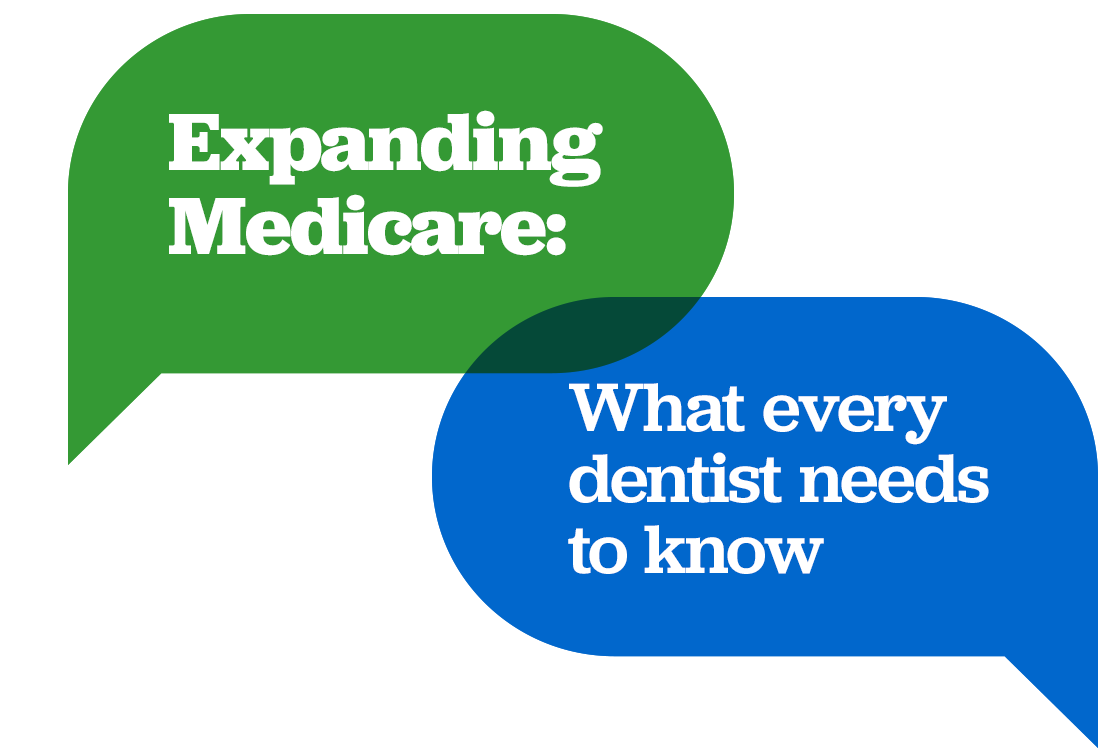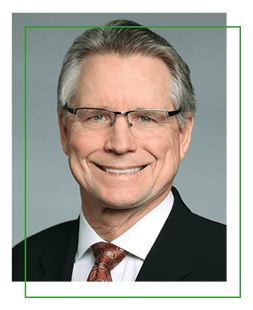

As Congress looks at expanding the Medicare program to include dental care, the ADA News talked to ADA President Daniel J. Klemmedson, D.D.S., M.D., about what this could potentially mean for dentists and their patients.

What’s going on?

Congress is currently considering a budget bill that includes a provision to expand the Medicare program to include dental benefits in Medicare Part B. As of Sept. 29, the Medicare Part B dental expansion had passed three key House committees but still needs to pass the House Rules Committee before heading to the House floor for a vote. The Senate is working on its own version of the bill. This is not anything new. Over the past 30 years there have been more than 30 bills introduced. The difference this year is that control of the White House, House of Representatives and Senate are aligned at a time when advocacy on the issue is at an all-time high.

Why does the ADA need to be involved?

When Congress intends to act on adding dental benefits to Medicare, the ADA has a duty to respond. The ADA believes that if the Association does not advocate on this issue, Congress will act without the ADA’s input, thereby creating a Medicare dental program that will not benefit patients or practitioners. Our involvement is also responsive to our constitutional duty, mission and vision which calls on us to advance the health of the public and help our members succeed.

What is the ADA’s policy on Medicare?

The ADA supports the development of policy at the federal, state and local levels that supports the fair, equitable, choice-driven provision of dental care to promote improved health and well-being in elderly patients. The Association also believes that any potential legislation that includes dental benefits for adults aged 65 and over in a taxpayer-funded public program should:
- Cover individuals under 300% of the federal poverty level.
- Cover the range of services necessary to achieve and maintain oral health.
- Be primarily funded by the federal government and not fully dependent upon state budgets.
- Be adequately funded to support an annually reviewed reimbursement rate such that at least 50% of dentists within each geographic area receive their full fee to support access to care.
- Include minimal and reasonable administrative requirements.
- Allow freedom of choice for patients to seek care from any dentist while continuing to receive the full program benefit.

Does the ADA support the current House bill to put dental benefits in Medicare?

No. Not as currently proposed. The ADA believes that any expansion of Medicare to include dental benefits should provide the range of services necessary for seniors to attain and maintain optimal oral health. The concern with the House bill is two-fold:
- The House bill does not remove the cost barriers that prevent seniors, particularly low-income seniors, from meaningfully accessing dental care. For example, even after the dental benefit is fully phased in by 2032, major services are only covered at 50%.
- Because the House bill places the dental benefit into Part B, the bill could limit the ability of dental practices to successfully participate, thus limiting access to care for patients. Part B would not work for dentistry due to the many differences between medicine and dentistry in areas such as electronic health record requirements, coding and payment parameters, claim submission requirements, audit and reporting requirements, and reimbursement levels.

What is the ADA’s proposal?

Based on the ADA’s policy, the ADA’s alternative proposal would create a distinct and separate part within Medicare (not within the Medicare Part B program) targeting low-income seniors 300% and below of the federal poverty level that would provide coverage for a range of services to help seniors achieve and maintain oral health. This alternative proposal would be based on the Medicare Advantage program and use private carriers with current administrative systems for claims processing, coding and payment to administer this new Medicare part. The ADA feels that if provision of oral healthcare is the goal, it is most effectively delivered and administered in systems and processes well understood by both patients and dentists. Medicare Part B is not that system.

If a bill passes, will this affect dentists or dental practices?

Yes. Whether dentists support or oppose adding a dental benefit to Medicare, and whether or not they choose to enroll, an expansion of the program to include this benefit will have an effect on dentists and dental practices — from commercial insurance reimbursement rates to disruptions in their patient bases.

What if dentists aren’t in favor of adding a dental benefit within Medicare Part B?
What should they do?

Participating in ADA grassroots advocacy is key. The dentists’ voices must be heard. We cannot ignore the process happening in Washington, D.C. if we want to affect change.
Medicare Explainer

What is Medicare?

Medicare is the nation’s health insurance program for people aged 65 and over or with certain disabilities. The program is administered by the Centers for Medicare & Medicaid Services, also known as CMS.

How does it work?

Medicare is one program but comprises four parts. Basic Medicare includes Part A (in-patient hospital services) and Part B (out-patient hospital services). There is also privatized administration including supplemental coverage through Part C (commonly known as Medicare Advantage) that about one-third of all seniors are enrolled in, and Part D, which covers prescription drugs.

How is Medicare funded?

According to CMS, Medicare is paid for through two trust fund accounts held by the U.S. Treasury: the Hospital Insurance Trust Fund and the Supplementary Medical Insurance Trust Fund. These accounts are funded by payroll taxes as well as income taxes paid on Social Security benefits and interest earned on the trust fund investments. The funds are authorized by Congress.

I’ve heard that Medicare is going bankrupt. Is that true?

According to the Medicare Board of Trustees' 2021 annual report, the Hospital Insurance Trust Fund, which funds Medicare Part A, will be depleted by 2026, unless Congress intervenes. The other fund, the Supplementary Medical Insurance Trust Fund, is well-supported. It pays for Part B benefits (both those administrated by CMS directly as well as those administered by private companies through Part C) and Part D. Congress is proposing to use prescription drug pricing reforms to pay for an expansion of Medicare Part B to include dental.

If Congress does vote to expand Medicare to include a dental benefit, will all dentists have to participate? Can I opt out?

Dentists will not be required to participate in Medicare. However, if there is a dental benefit in Part B, then the current rules regarding enrollment and opting-out will apply. If a dentist opts-out of Medicare, they are permitted to contract privately with Medicare patients to provide covered services.
The beneficiary must agree to pay fully out-of-pocket for a Medicare-covered service after signing a private contract with the provider. The patient then agrees not to submit a claim to Medicare and the provider also cannot submit a claim to Medicare. Note that this would apply to all the patients in that dentist’s practice who have a Medicare benefit, including any who have a Medicare Advantage plan. That’s because Medicare Advantage cannot pay claims to providers who have opted out of Medicare once there is a core dental benefit in Part B. Therefore, each dental office must carefully consider whether all their Medicare-covered patients will be amenable to forgoing their Medicare benefit and signing a private contract with the provider to pay out of pocket.
